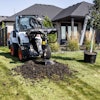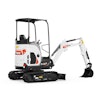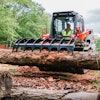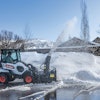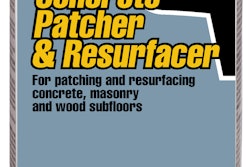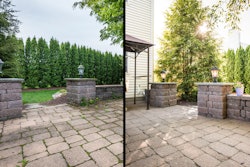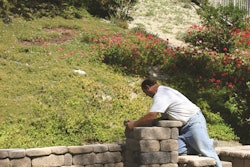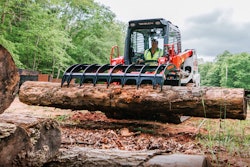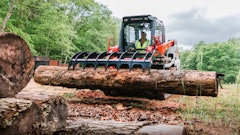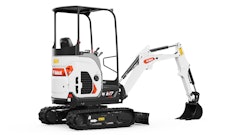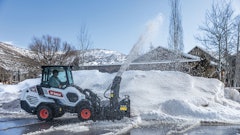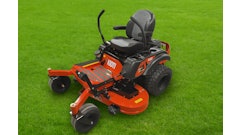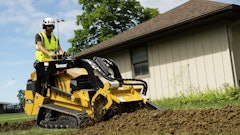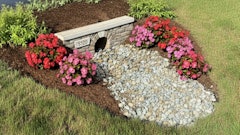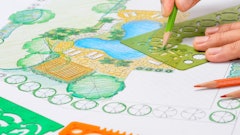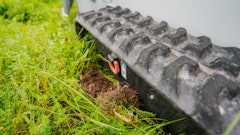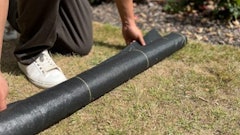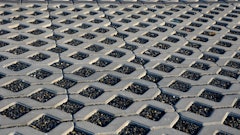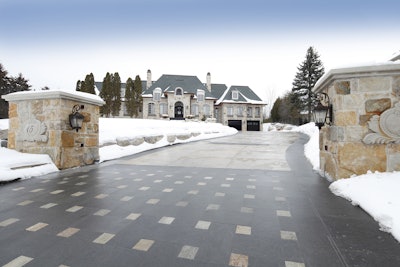
Key economic indicators are pointing to a good year for landscape construction.
Realtor.com’s 2016 housing forecast predicts new construction to drive the highest home sales since 2006, with six million homes sold in the new year. A recent Forbes story forecasts that housing construction and home prices will rise in 2016 and 2017. U.S. Census Bureau data shows that several important commercial segments, including lodging (i.e. hotels) and office buildings, continue to show impressive year-over-year gains.
Opportunities abound in hardscaping—from residential pools, patios, floors, walkways, and concrete driveways to malls, event halls, waterfronts, sport courts, skate parks, theme parks, business parks, hotels and hospitality. Furthermore, traditional hardscaping contractors who specialize in paver work, retaining walls, etc. could find an attractive expansion opportunity in patterned concrete.
Decorative concrete projects increasingly need to meet architectural design specifications or aesthetically match existing work. Yet typical stamped concrete is not always up to the task, particularly when stamp quality is insufficient and training is limited to the usual one-day seminar provided by some stamping tool manufacturers.
“Starting with a quality stamp is crucial, and so is proper training,” says Darlene Rodriguez, co-owner of Patterned Concrete by Rey, a Plano, TX-based full-service provider of stamped concrete, resurfacing, overlays, staining and scoring. “But many stamps look artificial, nothing like our rock, wood or natural patterns that people want today. What’s more, every job is challenging due to differences in location, layout and weather, as well as stamping pattern and stamping alignment used in the field.”
For contractors considering whether to work out of their trucks being the low-cost bidders or to become highly referred and compensated craftsmen, Rodriguez cautions, “If you sell only on price, anyone with a truck and some tools can replace you. If you sell top-notch quality with a trusted brand, your work will set the industry standard and the work will come to you.”
Franchise offers a concrete opportunity
To grow their businesses and take advantage of growing opportunities, more proactive concrete, landscape and hardscape contractors are turning to Patterned Concrete, a name familiar for decades and often used interchangeably—incorrectly so—with the generic term "stamped concrete".
Patterned Concrete is actually a registered name and trademarked brand of stamped concrete with industry expertise that goes back to 1972. The brand has expanded throughout North America and now includes 14 franchisees in both the U.S. and Canada. Beyond stamped concrete, its franchisees get exclusive branding, marketing, training, tooling and support for a competitive edge.
The system of imprinting concrete, as with any concrete placement installation, can be complicated for those without the proper training. However, Patterned Concrete teaches techniques that enable contractors to overcome the often complicated problems that many contractors run into.
One of the most important aspects of Patterned Concrete’s training is that it really never ends. The basics are first introduced. Then, as the contractor gets more comfortable, further teaching allows them to get more involved in bigger and more interesting work.
In addition to this, Patterned Concrete contractors are always willing to pass along some tricks of the trade to each other because they are not competitors; each having their own territories.
The average startup costs will vary from territory to territory, but in most cases contractors should expect a $30,000 to $60,000 investment as a starting point. That investment allows a contractor to receive all the leads—generated by the corporate office—for that territory.
Trusted brand name
“The Patterned Concrete brand helps us win jobs because everyone knows the name,” says Rodriguez. “Architectural designers are increasingly specifying Patterned Concrete in their plans, which helps us to secure the work and outmaneuver low-cost bidders.”
In the residential market, a larger organization, such as a franchise with large footprint, instills confidence in buyers because it seems like a much more "legitimate" business. That can be a deciding factor in winning a hardscaping job.
“Not many people are installing plain white concrete residentially these days; it is mostly stamped,” says Dino Padula, a project manager at Patterned Concrete Mississauga Inc., a franchisee in Mississauga, Canada. “But architectural concrete is a permanent product and customers do not want to take chances with a fly-by-night contractor who will not return phone calls after payment.”
Common projects Patterned Concrete contractors are asked to complete include driveways, pool decking, and outdoor patios for residential areas, along with large projects like skate parks, malls and event centers.
According to Padula, even though individual franchisees solicit sales in their designated territory, the company provides promotional support in various media as well as a healthy supply of sales leads from inquiries within their sales territory. This has helped to build Padula’s business much faster than he and his partners could have achieved on their own.
“Even though we had decorative concrete experience before becoming a franchisee, the Patterned Concrete brand gave us the edge with customers because they knew we had been thoroughly trained, had a reputation to uphold, and would be held accountable for our work,” says Padula.
Tools of the trade
Unlike typical soft rubber stamps in the industry that lack sufficient detail, Patterned Concrete stamps are imprinted from true pieces of stone and other natural materials to produce a textured, authentic look.
As such, the pattern for Old English Brick displays worn-out identification stamps in the brick; Adoquin has a volcanic look with course ridges, chisel marks, and craters; and Board comes complete with nail holes. Some patterns, in fact, are deep enough to be grouted for an even more authentic look.
“Builders and stone masons have entered my Patterned Concrete showroom and tried to order pavers or stones, not knowing that our product is actually a trademarked, very aesthetic form of stamped concrete,” says Rodriguez. “It is nice to know that our product can pass the scrutiny of even some stone mason industry professionals.”
Because franchisees can rent stamps from Patterned Concrete corporate or any franchisee, they have full access to any style required without having to own every tool. Currently, the company offers over 30 unique styles in a number of sizes.
“The textures are seamless and we can give customers an authentic look in any style they want from wood, slate, and brick to cobblestone, herringbone, and random cut flag,” adds Padula.
When the need arises, the company will even create new custom patterns at a reasonable cost. “Recently, we had to match some old stone pavers in a big residential job,” says Rodriguez. “We sent a sample to our corporate office along with some photos. Within two weeks, they created a custom stamp that matched the existing home’s concrete driveway. With a minor change, we completed the job and the customer was happy.”
Though the stamps of franchisees are made with great attention to detail, they are also made to last. “I have been using my original Patterned Concrete stamps since 1992 and they are still performing well,” says Rodriguez.
Training and tricks of the trade
Though the typical one-day, stamped concrete class offered by stamp manufacturers may be enough to get a contractor started, it is just as likely to get him in trouble according to Rodriguez.
“One-day classes often teach you on a 10’x10’ slab,” says Rodriguez. “That’s easy; you just start in one corner and go. But when you work in a backyard, you’re dealing with variables like weather, timing and backyard shape. That may include alcoves that require you to cut in the stamping work by hand.”
“We are often called in to correct the decorative concrete work of other contractors that have ‘gone bad,’” adds Rodriguez. “One contractor had poured about 10,000 square feet of decorative concrete on a big residential project, but the work got away from him. He tried to overlay it, and now 5,000 square feet of it has to come out.”
While Rodriguez and her husband had almost two decades of textured concrete pool deck experience before becoming franchisees, they found the Patterned Concrete training they received invaluable for developing their business.
According to Rodriguez, “We were trained for four months on the job by a neighboring franchisee before we went out on our own. Afterward, anytime we had a question we could call headquarters or a franchisee and someone had an answer.”
Because franchisees have exclusive territories and are routed sales leads, the relationship with other franchisees is cooperative rather than competitive.
After decades in the business, a highlight of the year for Rodriguez is the annual Patterned Concrete convention. There she and other franchisees learn the latest techniques, and share tried-and-true tips with each other.
“As franchisees, we work as a team because the brand is stronger when we all succeed,” says Rodriguez.
Consistent quality
Another advantage of working as a franchisee is that the corporate office tracks all jobs to ensure a consistent, quality match when future repair or renovation is required.
Specs including footages, color and pattern used on the project are logged into a central database at the company’s headquarters. This allows the franchisee to match previous work at any later time.
“Any contractor that wants to take their business to the next level should look into becoming a Patterned Concrete franchisee,” concludes Padula. “It is the best investment my partners and I have made.”
For more info, visit http://patternedconcrete.com.
